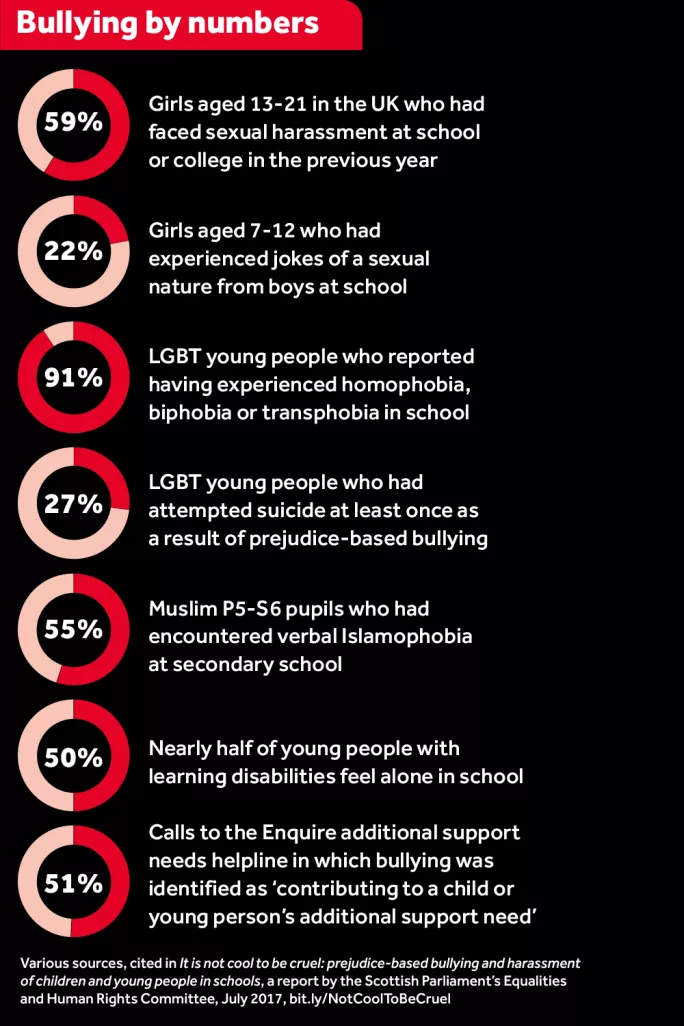Bullied kids want ‘simply to survive their education’

Teachers should undergo compulsory training on bullying and be forced to record incidents, according to a controversial parliamentary report, which says the schools system is failing to protect children from prejudice.
The inquiry into prejudice-based bullying - which has already been criticised by teacher unions - claims to reveal huge inconsistencies in approach across Scottish schools. It further suggests that some teachers are “dismissive” about children who have been bullied.
But teachers have expressed concern that while many of the issues raised in the report must be addressed, its findings are based on anecdotal evidence and do not reflect widespread anti-bullying efforts in schools.
In a foreword to It is not cool to be cruel, Equalities and Human Rights Committee convener Christina McKelvie warns that, for many children, “school is becoming a battle against prejudice, bullying and sexual harassment”. She adds that “their primary goal is simply to survive their education, emotionally, psychologically and, now more than ever, literally, with 27 per cent of LGBTI young people attempting suicide”.
The report concludes that bullying too often is “almost inescapable” when a pupil has a visible difference, such as a physical disability or clothing such as the hijab. It says gender-based bullying and harassment are a “daily occurrence” for some girls. Racism, meanwhile, has made a “resurgence”, fuelled by news reports of terrorism, as well as extreme discourses around Brexit and Donald Trump’s election giving “credence to views previously considered off-limits”.
A “growth of negative school environments” is blamed on “deficiencies in teacher training and the failure [of CPD] to challenge inappropriate behaviour and language”, as well as social media; a “lack of leadership” in building a strong school ethos and supporting teachers to challenge bullying is also cited.
‘Lack of leadership’
Many teachers lack the confidence to address prejudice-based bullying, while others are “dismissive” or “unsympathetic” about victims’ concerns and, in the case of LGBTI pupils, their identities. The inquiry also heard that teachers often mistakenly assume victims of racist bullying are “coping fine”, simply because their performance in class has not dropped.
Some teaching materials even “reinforce stereotypes”, such as sex education that deals with biology but not attitudes towards consent and sexual crimes; this was made more stark by reports of girls being raped at school or coerced into sending explicit images, the inquiry heard.

The report’s authors are calling for the Scottish government and local authorities to arrange compulsory CPD for teachers on issues such as equalities and children’s human rights, updated regularly to keep pace with legislation, as well as the fast-changing world of social media.
LGBT Youth Scotland told the inquiry that it has been “inundated” with requests to train teachers, and the voluntary organisation provided training to 1,500 of them last year.
The report finds huge inconsistency in school and local authority approaches to bullying, and calls for the mandatory recording of bullying incidents - including whether they involve prejudice - to form a clearer national picture; school inspectors should be asked to “ensure compliance” with this practice, it adds. The inquiry found that 26 of Scotland’s 32 local education authorities had a formal policy requiring monitoring of bullying, but only 14 could provide evidence of it.
The EIS, Scotland’s biggest teaching union, has raised concerns about the inquiry’s reliance on “personal and anecdotal” evidence. General secretary Larry Flanagan said: “A weakness of the final report was that it failed to capture and reflect the huge body of anti-bullying work being undertaken in schools already, perhaps creating a false impression that this was not a matter schools were concerned with.”
Mr Flanagan said that “all bullying, or perceived bullying, needs to be treated seriously” and agreed that more CPD on equality issues was needed - a topic that the EIS was in discussion with the Scottish Government about.
But he questioned the need to make training compulsory for teachers. “Mandatory training may seem like an easy route, but actually, it can simply be a way of ticking a box rather than tackling the issue in a comprehensive manner,” he said.
Katie Rafferty, director of anti-bullying service Respectme, said the recording of incidents would help to “build a better picture” of the problem across Scotland, but that data should not be used to rank and rate schools and other organisations. She added that parents and carers, not just schools, had a “vital role” to play in addressing the problem.
The Equalities and Human Rights Committee welcomed a commitment from education secretary John Swinney to delay the new National Approach to Anti-Bullying until he had considered the inquiry’s findings.
A government spokesperson said it was “important for all schools to have anti-bullying policies in place, and it is vital that LAs and teachers challenge any racist, homophobic and abusive behaviour in our schools”.
You need a Tes subscription to read this article
Subscribe now to read this article and get other subscriber-only content:
- Unlimited access to all Tes magazine content
- Exclusive subscriber-only stories
- Award-winning email newsletters
Already a subscriber? Log in
You need a subscription to read this article
Subscribe now to read this article and get other subscriber-only content, including:
- Unlimited access to all Tes magazine content
- Exclusive subscriber-only stories
- Award-winning email newsletters